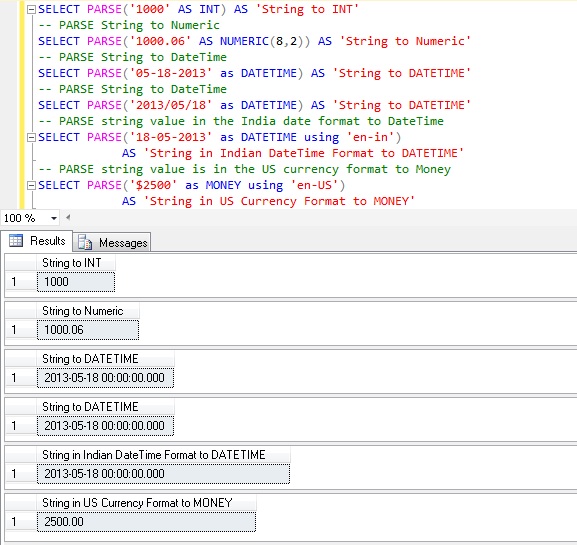PARSE is one of the new built-in conversion function introduced as a Part of Sql Server 2012. PARSE function converts the string expression to the requested data type. It tries it’s best to translate the string value to requested type but if it fails to translate then raises an exception.
Important Note: This PARSE function is not a native Sql function, instead it is a .NET Framework Common Language Run-time dependent function. Then obviously it will have the performance overhead and also requires the presence of .NET CLR on the database Server. Continue to use the existing CAST and CONVERT functions wherever it is possible.
Syntax: PARSE ( string_value AS data_type [ USING culture ] )
Parameter Details:
string_value : String expression which needs to be parsed.
data_type : Output data type, e.g. INT, NUMERIC, DATETIME etc.
culture : Optional string that identifies the culture in which string_value is formatted. If it is not specified, then it takes the language of the current session.
Now let us understand this PARSE function with examples:
-- PARSE String to INT
SELECT PARSE('1000' AS INT) AS 'String to INT'
-- PARSE String to Numeric
SELECT PARSE('1000.06' AS NUMERIC(8,2)) AS 'String to Numeric'
-- PARSE String to DateTime
SELECT PARSE('05-18-2013' as DATETIME) AS 'String to DATETIME'
-- PARSE String to DateTime
SELECT PARSE('2013/05/18' as DATETIME) AS 'String to DATETIME'
-- PARSE string value in the India date format to DateTime
SELECT PARSE('18-05-2013' as DATETIME using 'en-in')
AS 'String in Indian DateTime Format to DATETIME'
-- PARSE string value is in the US currency format to Money
SELECT PARSE('$2500' as MONEY using 'en-US')
AS 'String in US Currency Format to MONEY'
Below example demonstrates how PARSE function tries it’s best convert the input string value to a specified data type even when the specified value is not in the correct format.
SELECT PARSE('08-JUNE-2013' AS DATETIME)
SELECT PARSE('08-JUN-2013' AS DATETIME)
SELECT PARSE('2013JUNE08' AS DATETIME)
SELECT PARSE('08/JUN/2013' AS DATETIME)
All the above statements will return the same result and it is: 2013-06-08 00:00:00.000
Now try to PARSE an invalid string value to DATETIME:
This conversion fails as February month will not have 31st day.
--PARSE invalid String to DATETIME
SELECT PARSE('2012/02/31' as DATETIME)
GO
Result:
Msg 9819, Level 16, State 1, Line 1
Error converting string value ‘2012/02/31’ into data type datetime using culture ”.
Below PARSE function will fail to translate the date. Because the culture parameter specified is en-us, but the string value specified is not in US format. US Date format excepts month first instead of day and then day and year.
--PARSE invalid String to DateTime
SELECT PARSE('18-05-2013' as DATETIME using 'en-us')
GO
Result:
Msg 9819, Level 16, State 1, Line 1
Error converting string value ’18-05-2013′ into data type datetime using culture ‘en-us’.
Difference between PARSE and CONVERT function.
Below example demonstrates the difference between PARSE and CONVERT function. PARSE function will successfully converts the string ‘Saturday, 08 June 2013’ to date time, but the CONVERT function fails to convert the same value. That is PARSE function tries it’s best to convert the input string value to the requested type, but CONVERT function requires the input string to be exact format no variations allowed.
--PARSE Function Succeeds
SELECT PARSE('Saturday, 08 June 2013' AS DATETIME)
AS 'PARSE Function Result' GO
SELECT PARSE('Sat, 08 June 2013' AS DATETIME)
AS 'PARSE Function Result' GO
SELECT PARSE('Saturday 08 June 2013' AS DATETIME)
AS 'PARSE Function Result' GO
--CONVERT Function Fails
SELECT CONVERT(DATETIME, 'Saturday, 08 June 2013')
AS 'CONVERT Function Result' GO
SELECT CONVERT(DATETIME, 'Sat, 08 June 2013')
AS 'CONVERT Function Result' GO
SELECT CONVERT(DATETIME, 'Saturday 08 June 2013')
AS 'CONVERT Function Result' GO
RESULT:
PARSE Function Result
———————–
2013-06-08 00:00:00.000
PARSE Function Result
———————–
2013-06-08 00:00:00.000
PARSE Function Result
———————–
2013-06-08 00:00:00.000
CONVERT Function Result
———————–
Msg 241, Level 16, State 1, Line 3
Conversion failed when converting date and/or time from character string.
CONVERT Function Result
———————–
Msg 241, Level 16, State 1, Line 1
Conversion failed when converting date and/or time from character string.
CONVERT Function Result
———————–
Msg 241, Level 16, State 1, Line 1
Conversion failed when converting date and/or time from character string.
You may like to read the below new built-in function’s introduced in Sql Server 2012:
| New Built in Functions introduced in Sql Server | |||||||||||||||
| CONVERSION FUNCTIONS | |||||||||||||||
| PARSE | TRY_PARSE | ||||||||||||||
| TRY_CONVERT | |||||||||||||||
| STRING FUNCTIONS | |||||||||||||||
| CONCAT | FORMAT
| LOGICAL FUNCTIONS |
CHOOSE |
IIF
| DATE AND TIME FUNCTIONS |
EOMONTH |
DATEFROMPARTS |
DATETIMEFROMPARTS
| SMALLDATETIMEFROMPARTS |
DATETIME2FROMPARTS
| TIMEFROMPARTS |
DATETIMEOFFSETFROMPARTS
| | |||
